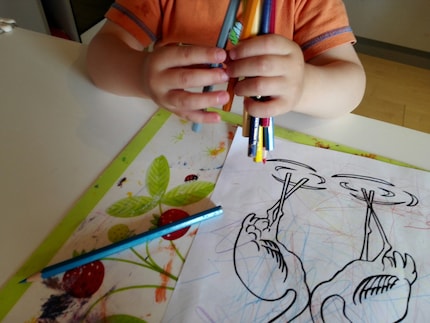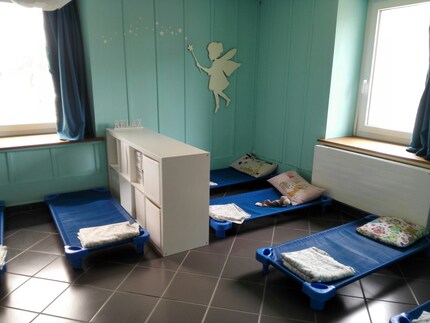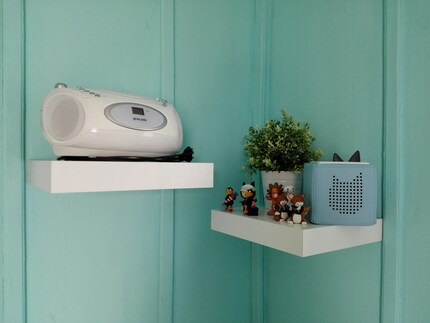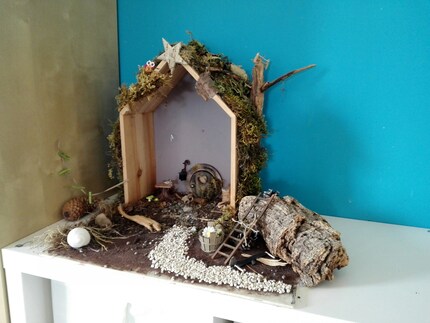
Background information
"You have to be born to be an educator!"
by Myrtha Brunner

What does everyday life at a daycare centre look like? Can I expect an idyll or pure madness? Are nursery nurses only allowed to play all day? I take a look behind the scenes at the "Kita Cat" daycare centre for you.
6:00 a.m., Kita Cat daycare centre in Kölliken (AG): The most intensive time of the day begins for two carers on the early shift. For the first three hours, they are responsible for greeting, entertaining and feeding all the children in the "Baby" and "Grosse" groups. All other nursery nurses do not start their shift until 9.00 am. The only advantage of the early shift is that the children don't all arrive at the same time. There is enough time to set up all the rooms despite the small number of staff. In addition to drinks glasses, water and materials for planned activities, breakfast is provided for all early risers. An additional service provided by Kita Cat to relieve parents.
At nine o'clock, the singing circle begins with all the children present, usually led by the trainee and the apprentice. During this time, the professionals hold the daily report. They discuss the children's attendance and state of health, any challenges and the allocation of the day's tasks.
Afterwards, the older children (aged two and over) can play freely with the toys provided. The teacher has planned a colouring lesson for the baby group. The older children are given a few coloured pencils and a sheet of paper with a flamingo. Let's get scribbling. I sit in the middle of two tiny tots, but apart from holding out new coloured pencils, I have nothing to do. In the background, two almost eight-month-old babies are sitting in the play corner. They are barely audibly occupied with themselves. Screaming? Not a thing. Only one boy gets a little restless after half an hour.

The attention span of a five to seven-year-old child is around 15 minutes. For a toddler, correspondingly less. My feeling that the colouring lesson could therefore turn into a disaster is not confirmed. I wait in vain for action or a challenge. I can't hear the older children downstairs either.
The nappy-changing ritual begins at half past ten. As expected, the first protests start to spread. Is this going to be a stressful moment for the carers? No, it's over as quickly as the moaning started. To calm things down and as a ritual before the meal, the trainee sings a few songs with the little ones. Lunch is served at eleven o'clock, followed by brushing teeth and bedtime. This also runs like clockwork. The little ones don't throw food on the floor or knock over a glass of water. They are only reminded to eat with a spoon instead of their fingers. Tiredness is evident in the children's eyes. It gets even quieter and I decide to go and find the big group.
The older children also eat quietly, hardly speak, brush their teeth without ifs and buts and run to their little blue beds without resistance. I'm surprised, because I would have expected more razzmatazz. Is it always like this, I ask the carers. "No", they all tell me straight away.


The grown-ups spend the afternoon in the forest, the little ones in the garden. I decide to leave, because I'm not expecting any more action today. On this day, the den of roaring lions looks more like a flock of tame lambs.
However, everyday life is rarely so harmonious. Each of the carers confirms this. They know that this is no ordinary day. The children are on their best behaviour. "Come back again and you'll experience a different situation," says Sara, the daycare centre manager. She tells me that there are days when even they as professionals reach their limits: Because everything goes wrong. Because all the children are demanding something at the same time. Because people are absent. Because the weather doesn't play ball. Because they haven't slept enough themselves or because children's illnesses take over.
In addition to their role as educators, the carers at the "Kita Cat" crèche have a number of additional tasks to complete. They repaint the walls, redesign the rooms or the garden, buy food for the shared lunch, plan small events or take care of the maintenance of the small garden. So it's not surprising that the carers are out and about with a lawnmower, watering the new little wicker houses or repairing bobby cars. In addition to these unconventional tasks, there are also everyday chores such as cooking and cleaning. Cleanliness is extremely important when the little bugs are crawling and running around.
The team also defines an annual main theme. Last year, the little gnome "Nelio" accompanied the children. The carers put their heart and soul into creating a mini house for the elf. It still stands in the dining room today and delights children and parents alike. It is not unusual for cutlery and a plate to suddenly appear on the small table or for a letter to be left for the children. Nelio has become a fictional reference person for the children.

This year, the children are learning more about animals. The teachers are adapting the activities thematically to the corresponding animal. As some children are at the crèche five days a week, the activities are alternated every day.
Finally, all discussions with parents are an important part of the daily routine. This includes entry, intermediate, exit, drop-off, pick-up and door-to-door conversations. A childcare specialist doesn't just play with the children all day long. It's hard work, where coffee in between is probably a foreign word rather than the norm, where back problems from lifting children incorrectly are part of everyday life and where a great deal of empathy is a prerequisite. "You have to be born for this job," the daycare centre manager Sara tells me during the last interview.
The upbringing and care of children is a polarising and recurring topic. If you don't want to miss any articles about it, follow my author profile.
.
I’m the cook, cleaner, police officer, nurse, entertainer, motivator, author, storyteller, coach, organiser, chauffeur, lawyer and judge. To put it simply, I’m a mum to a daughter and not just a (Content) Manager at the office but also at home.
Interesting facts about products, behind-the-scenes looks at manufacturers and deep-dives on interesting people.
Show all